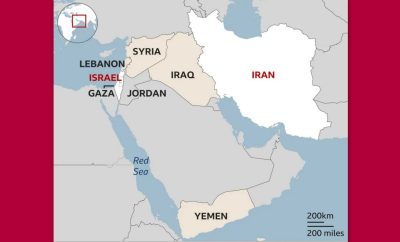
Actions abroad show why Israel must act unilaterally to defend itself
This past weekend, the American Israel Public Affairs Committee held its annual policy conference in D.C. As usual, foreign leaders, prominent senators from both parties, and top administration officials headlined the event. But unlike past years, many of the most prominent Democratic presidential nominee contenders declined to attend. Their informal and undeclared boycott illustrated the leftward, anti-Israel wave reverberating through the Democratic Party right now.
There has also been ample anger among Democratic policy advisers and officials about the Trump administration’s recognition of Israeli sovereignty over the Golan Heights, a mountain region separating Israel and Syria and looking down upon both. Israel took the Golan in 1967 and then retook it after the surprise 1973 Syrian invasion of the country. For security reasons, successive Israeli governments have held the sparsely populated territory, especially after 1990s-era peace talks between Israel and Syria went nowhere.
There have been three main criticisms of Trump’s move on the Golan Heights. Some critics have said recognizing the Golan would inflame Arab opinion and allow Syrian President Bashar Assad to reconsolidate control over Syria. Others worry that the move might bless land grabbing. Martin Indyk, a former assistant secretary of state for Near Eastern affairs, argued it would encourage “annexationists” to go after the West Bank, and many others drew inaccurate parallels between Israel’s possession of the West Bank and Russia’s seizure of the Crimea. The last major criticism is that recognizing Israel’s claim to the Golan so close to Israel’s elections is a gift to Israeli Prime Minister Benjamin Netanyahu.
Put aside the fact that all of Trump’s Middle East concessions are reversible when a Democrat takes office. Many of the complaints leveled at Trump’s move are overblown. Despite echo chamber hand-wringing in Washington, the Arab-Israeli dispute has become peripheral to the major challenges and concerns facing the Middle East. As with other sky-is-falling predictions, talk of outrage proved false, and the event proceeded with barely a whimper.
As for Indyk’s concern? Israel cemented its desire to hold the Golan for security concerns back in 1981, but it has been willing to negotiate away the Sinai, the Gaza Strip, and the vast majority of the West Bank except for some portions which would then be subject to land swaps. Of course, Indyk should know this as he helped negotiate this formula during the Clinton administration.
As for the Crimea: It was Syria that invaded Israel and then lost its launch pad. Ukraine did not invade Russia.
Finally, there is a certain hypocrisy to Democratic complaints of Trump interfering in Israel’s elections when President Obama was very blunt about his efforts to do so, albeit in the opposite direction.
The real reason why Israel should possess the Golan is because recent events show the international community is too craven to be trusted to defend it against annihilationist aggression.
Consider international silence with regard to China’s imprisonment of more than 1 million Uighur Muslims in concentration camps. China has gone so far as to station commissars in every Muslim’s house to ensure they do not act in accordance with their faith. Within the camps, Uighurs allegedly suffer routine torture; some do not make it out alive. Meanwhile, the Chinese government razes historic Uighur neighborhoods and transplants Han Chinese into the new construction. Why the silence? Simply because the world is afraid of China’s economic muscle or is afraid that their consumers wouldn’t want to pay an extra 25 or 50 cents on Chinese products if Beijing gets annoyed with the criticism. That the Uighurs are only the latest in a long line of victims of Beijing’s ethnic cleansing campaigns only underscores the point.
Then there is Germany, which not only has refused to stop lethal trade with Iran, but whose foreign ministry actively celebrates Iran’s Islamic Revolution. Why? A desire for commercial advantage. The irresistibility of a good business deal is also why Dutch firms provided the chemical precursors, which Iraqi dictator Saddam Hussein used against the Kurds 31 years ago.
After surviving the Holocaust but losing 6 million of their own, Jews often say “Never Again.” Israelis, who have faced their neighbors’ efforts to wipe them off the map several times before, mean it. Anti-Zionism may be popular on college campuses and on the Democratic fringe, but Jews understand that no other state experiences persistent efforts to end its existence, and they also recognize that for many among Iran and Syria’s leadership, Hezbollah, and Islamic State-style extremists, ending Israel means genocide. If Islamist extremists believed they could enslave and rape Yazidi women at will, why would any serious analyst believe they would treat Jews any better?
Back to the Golan. Western diplomats may condemn Trump for his actions, but so long as they repeatedly show the fear of their governments to stand up to principle, such hand-wringing should be ignored. After all, if one day Syria or Iran was in a position to overrun Israel, the only struggle in Europe at least would be how to best kowtow to or profit from the regimes waging genocide. If Europe wants to preserve diplomatic precedent, on the other hand, perhaps they can show their seriousness by standing up to those in Beijing and Tehran for whom genocide is simply a means to an end.
Michael Rubin is a resident scholar at the American Enterprise Institute, where he researches Arab politics, the Gulf Cooperation Council, Iran, Iraq, the Kurds, terrorism, and Turkey. He concurrently teaches classes on terrorism for the FBI and on security, politics, religion, and history for US and NATO military units.
A former Pentagon official, Dr. Rubin has lived in post-revolution Iran, Yemen, and both pre- and postwar Iraq, and he spent time with the Taliban before 9/11. He is the author, coauthor, and coeditor of several books exploring Iranian history, American diplomacy, Kurdish studies, and Shi’ite politics, including “Kurdistan Rising” (AEI




